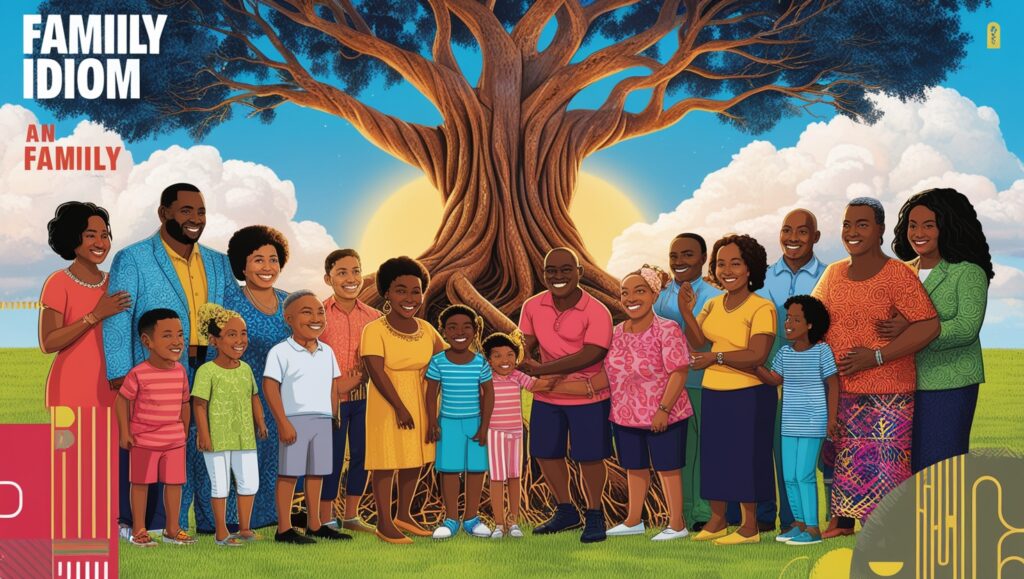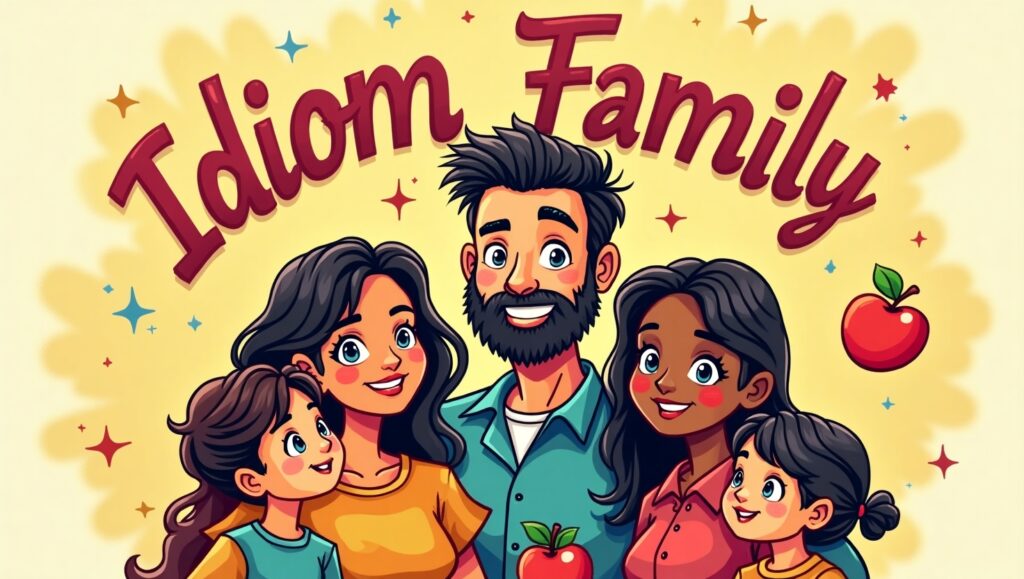Introduction
Language is more than simply vocabulary and grammar; it’s also commonplace by means of the manner of the use of expressions that deliver culture. Idioms are one of the richest devices in language, permitting people to talk thoughts, emotions, and values in memorable processes. Among those, family-related idioms stand out due to the truth they draw upon one of the most time-honored human critiques: relationships inside a circle of relatives.
The phrase “idiom family” refers to idiomatic expressions that contain family terms alongside mother, father, son, daughter, brother, sister, blood, family, and home. These idioms frequently reflect the importance of own family bonds, traditions, and dynamics sooner or later of precise cultures.
This article explores what an idiom circle of relatives is, its meaning in communication, commonplace idiomatic expressions associated with one’s own family, their origins, and their characteristic in every literature and regular speech. By the way, you’ll have a deep understanding of methods, circles of relatives, idioms that decorate language, deliver cultural values, and add color to both written and spoken conversation.
What Is an Idiom Family?
An idiom is a phrase or expression whose meaning isn’t just like the literal meaning of its terms. For instance, the idiom “blood is thicker than water” does not virtually discuss liquid but symbolizes the robust loyalty of one’s own family ties over friendships.
When we use the time period idiom own family, we are searching for recommendations from idioms that include phrases associated with own family contributors or relationships. These idioms spotlight how deeply family concepts are rooted in ordinary conversation.
Importance of Family Idioms in Language
Family idioms play an important function in language for numerous reasons:
- Cultural Reflection – They replicate values and ideals approximately in the circle of relatives’ life in extraordinary societies.
- Emotional Connection – Because circle of relatives is a shared human experience, idioms related to one’s own family are relatable and powerful.
- Communication Efficiency – Idioms permit audio systems to specific complicated thoughts in only a few terms.
- Storytelling Power – Writers, poets, and audio systems use family idioms to make their language greater, exceptional and fantastic.
For instance, announcing “like father, like son” is a more impactful manner of describing inherited inclinations than explaining the concept in element.
Common Idioms inside the Family Category
Here are some of the maximum extensively used circle of relatives-associated idioms, along factor their meanings and examples:

1. Blood is Thicker Than Water
Meaning: Family relationships are more potent than friendships or different connections.
Example: Even despite the fact that he argued with his brother, he still helped him flow due to the truth blood is thicker than water.
2. Like Father, Like Son
Meaning: Children frequently resemble their parents in conduct or personality.
Example: He has the same humorousness as his dad—like father, like son.
3. Run within the Family
Meaning: A trait, dependency, or condition this is common amongst family people.
Example: Musical know-how seems to run within the family.
4. Black Sheep of the Family
Meaning: An individual who is considered one of a kind, rebellious, or a shame inside a circle of relatives.
Example: His uncommon life-style made him the black sheep of the family.
5. Chip Off the Old Block
Meaning: An infant who carefully resembles their parents in character or appearance.
Example: She’s a chip off the antique block, just like her mother in kindness and determination.
6. Home Is Where the Heart Is
Meaning: True comfort and belonging come from the people you need, no longer a particular region.
Example: Even on the same time as touring, she felt at home because of the reality her circle of relatives end up along an aspect her—home is wherein the coronary heart is.
7. Skeleton within the Closet
Meaning: A hidden family thriller that might motivate embarrassment if located out.
Example: Every family has as a minimum one skeleton inside the closet.
8. Mother Hen
Meaning: A person who seems after others excessively, like a defensive mother.
Example: She fusses over her pals like a mother bird.
9. Born with a Silver Spoon in One’s Mouth
Meaning: To be born properly into a rich family.
Example: He in no manner had to paint hard because of the reality he became born with a silver spoon in his mouth.
10. Big Brother
Meaning: Refers to a professional who determines who video shows gadgets and controls others (popularized through George Orwell’s 1984).
Example: The new law felt like Big Brother searching everybody.
Idiom Family Across Cultures
Idioms about one’s own family are not restricted to English. Every tradition uses family-based idioms, even though meanings can vary:
- Chinese: “家和万事兴” (If the own family lives in harmony, all affairs will prosper) emphasizes concord.
- Spanish: “De tal palo, tal astilla” (From the sort of stick, this sort of splinter) is just like father, like son.
- Arabic: “الابن على سر أبيه” (The son follows his father’s secrets and techniques and techniques) conveys inherited trends.

Family Idioms in Literature
Writers and poets regularly use family idioms to bolster problem topics:
- Shakespeare referenced family ties with idioms like “kindred spirits” in his performances.
- Charles Dickens used expressions like “skeleton inside the closet” in exploring social and own family secrets and techniques.
- Modern authors often use idioms like “black sheep of the family” to offer a reason behind characters who don’t form in.
- The use of own family idioms in literature offers depth, relatability, and cultural authenticity.
Family Idioms in Everyday Communication
In everyday conversations, family idioms appear in contexts collectively with:
Workplace: “She’s the mother chook of the employer.”
Friendship: “We might not be associated, however he’s like a brother to me.”
Parenting: “It runs within the own family.”
Social assertion: “The authorities are appearing like Big Brother.”
Because one’s own family is big to human life, those idioms certainly combine into casual speech.
Why Family Idioms Are Powerful Tools
Family idioms go through because of the fact they:
- Use acquainted necessities to give a reason for precise thoughts.
- Trigger emotional connections in listeners.
- Make communique colorful, memorable, and impactful.
Cross cultural boundaries, considering that circle of relatives is a well-known difficulty.
Educational Value of Family Idioms
Teachers and college students can benefit from analyzing idioms in the circle of relatives category:
Language Learning: Idioms make learning more appealing and help students understand their lifestyles.
Creative Writing: Using idioms enhances descriptive capabilities.
Cross-Cultural Studies: Exploring idioms across languages, famous cultural variations and similarities.
For instance, comparing English idioms like “blood is thicker than water” with Asian proverbs about family concord can deepen cultural appreciation.
Extended List of Family Idioms
Here’s a broader listing of own family idioms with meanings:
- Father Figure – A guy who offers steering like a father.
- Mother Tongue – One’s first language.
- Brotherly Love – Affection among brothers (or deep friendship).
- Sisterhood – Solidarity amongst girls.
- Family Man – A guy devoted to his own family.
- Household Name – An individual or brand famous to anybody.
- Mother Nature – Personification of nature as a nurturing stress.
- Relative with the aid of the manner of Marriage – A family member via marriage, no longer blood.
- Close-Knit Family – A very supportive and loving circle of relatives.
- Dysfunctional Family – A own family with risky or complicated relationships.
MCQS On Idiom Family
1. What does the term “idiom circle of relatives” normally speak over with?
A) Idioms that describe traditional meals in families
b) Idioms that consist of family-related phrases like mother, father, son, or home
c) Idioms which is probably first rate used interior families
d) Idioms which may be approximately prolonged associate and children only
Answer: b) Idioms that encompass circle of relatives-associated terms like mother, father, son, or domestic
2. Which of the subsequent idioms means “circle of relatives bonds are more potent than friendships”?
A) Skeleton within the closet
b) Blood is thicker than water
c) Black sheep of the family
d) Home is wherein the coronary coronary heart is
Answer: b) Blood is thicker than water
3. The idiom “Black Sheep of the Family” refers to:
a) The most successful family member
b) The member of the family who’s rebellious or brings shame
c) A hardworking circle of relatives business organisation
d) A character who hides circle of relatives secrets and techniques and techniques
Answer: b) The member of the family who is rebellious or brings disgrace
4. Which idiom expresses that traits or conduct are inherited inside a circle of relatives?
A) Chip off the antique block
b) Like father, like son
c) Runs within the family
d) Born with a silver spoon
Answer: c) Runs within the family
5. The phrase “Home is where the coronary heart is” way:
a) A house is generally higher than an condo
b) True belonging comes from loved ones, now not an area
c) Families need to in no way skip a long manner away
d) Everyone prefers their formative years home
Answer: b) True belonging comes from loved ones, not an area
6. Which author popularized the idea of “Big Brother” as an idiom?
A) William Shakespeare
b) Charles Dickens
c) George Orwell
d) Ernest Hemingway
Answer: c) George Orwell
7. In Chinese way of life, the idiom “家和万事兴” way:
a) Family bonds are more potent than water
b) If the family lives in harmony, all affairs will prosper
c) Parents are stricter than instructors
d) Secrets in families want to live hidden
Answer: b) If the family lives in concord, all affairs will prosper
8. Which idiom refers to being born into wealth and privilege?
A) Chip off the vintage block
b) Household name
c) Born with a silver spoon in a single’s mouth
d) Family man
Answer: c) Born with a silver spoon in a unmarried’s mouth
9. Why are circle of relatives idioms taken into consideration as powerful equipment in language?
A) They are used simplest in literature
b) They are easy to translate word-for-word
c) They be a part of summary mind to acquainted human critiques
d) They aren’t often used, making them specific
Answer: c) They join precise thoughts to acquainted human research
10. Which of the following is an example of a top notch own family idiom?
A) Dysfunctional circle of relatives
b) Skeleton within the closet
c) Close-knit circle of relatives
d) Black sheep of the circle of relatives
Answer: c) Close-knit family
Final words :
Family-associated idioms are greater than in reality colourful expressions; they will be cultural treasures that mirror human values, feelings, and relationships. From sayings like “blood is thicker than water” to “black sheep of the circle of relatives,” those idioms seize the joys, struggles, and dynamics of family life in strategies that undeniable language can not.
Across cultures, literature, and ordinary conversations, idiom households enhance communication via making it greater, brilliant, relatable, and emotionally impactful. They help us unique deep truths in only some phrases, bridge cultural gaps, and keep traditions at some stage in generations.
By reading and using family idioms, we now not simply grow our language talents but furthermore gain insights into the common importance of family bonds. Whether in lecture rooms, modern writing, or informal communication, the ones idioms hold to expose their timeless energy in connecting hearts and minds.
Read More About Idiom At Hitl mila
